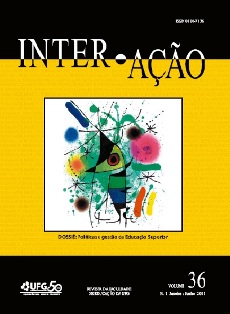HIGHER EDUCATION EXPANSION POLICIES IN POST-LDB/96 BRAZIL – CHALLENGES FOR EVALUATION
DOI:
https://doi.org/10.5216/ia.v36i1.15029Abstract
This paper presents partial results of the interinstitutional research, entitled ‘Evaluation and Expansion Policies for Higher Education in post-LDB/1996 Brazil’ undertaken by researchers affiliated to the Work Group on Higher Education Policies in the National Association for Research and Post Graduate Studies – GT 11/ANPEd. The research is part of the UNIVERSITAS/BR Integrated Project which seeks to investigate more thoroughly the phenomenon of higher education expansion and evaluation in Brazil after 1996. The analysis describes the global and local contexts in which higher education expansion policies and concepts of assessment were drawn up during the governments of Fernando Henrique Cardoso (1995-1998 and 1999-2002) and of Luiz Inácio Lula da Silva (2003 -2006 and 2007-2010). It concludes that the major challenge of the moment is how to provide an ongoing evaluation process which will guarantee an increase in places in higher education, while at the same time, responding to the demand for quality education.Downloads
Downloads
Published
How to Cite
Issue
Section
License
Inter-Ação uses the Creative Commons Attribution 4.0 License for Open Access Journals (Open Archives Initiative - OAI) as the basis for the transfer of rights. Open access means making documents available on the Internet free of charge, so that users can read, download, copy, distribute, print, search, or link to the full text of documents, process them for indexing, use them as input data for software programs, or use them for any other lawful purpose, without financial, legal, or technical barriers.
Authors publishing in this journal agree to the following conditions:
1) Authors retain copyright and grant the journal the right of first publication, with the work simultaneously licensed under the Creative Commons Attribution License, which permits redistribution of the work with attribution and first publication in this journal.
2) Authors are permitted to enter into additional, separate agreements for non-exclusive distribution of the version of the work published in this journal (e.g., for publication in an institutional repository or as a book chapter), with attribution and first publication in this journal.
3) Authors are permitted and encouraged to publish and distribute their work online (e.g. in institutional repositories or on their home page) at any time before or during the editorial process, as this may generate productive changes as well as increase the impact and citation of the published work.















